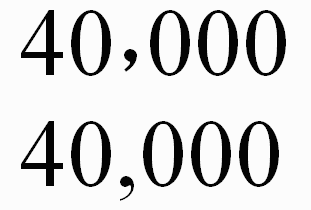Commas in Thousands
At work I edit a manual of design practices and from time to time people will write with suggested changes. Recently I had a guy who was asking me to add some information. In the e-mail he quoted a sentence from the manual and included the new information. He also edited some numbers I already had in the sentence to add a comma, making 3500 appear as 3,500.
I don't know where I picked it up, but it seems like I learned at some point that you don't need the comma in 4-digit numbers, but should include them with 5 digits and above. I looked through the manual and at least I was consistent. I did a search to see what the standard practice is and it was pretty useless. Wikipedia has a big long article about commas that says one standard is to use spaces (actually half spaces) between thousands, like this: 15 000 and another is to use commas like this: 15,000. Of course they didn't use a 4-digit number. Naturally they had to add the crazy thing where commas are used as decimal points and periods are used for thousands in some countries (which I learned about when I got my very first HP calculator that could be set to display numbers either way). In a discussion on Wikipedia, one contributor flat out refuses to ever use commas in numbers because it is WRONG (his caps) regardless of what the Wikipedia style manual tells him to do. That's insubordination.
Another article on Wikipedia about decimal separators rehashes and adds to some of the comma article. It goes as far as listing countries as dot countries, comma countries, and momayyez countries. I thought it was pretty amusing that the world was being divided up by the decimal separator they use and that the Middle East didn't follow either convention but came up with something completely different that I've never even heard of. However, the article does at least mention that some publishing house manuals of style do not include a comma in numbers 1000 to 9999.
That brings up one of the flaws of Wikipedia: tons of information but not always an answer. And sometimes way more information and opinion than you really want or need.
Although the Wikipedia article about the momayyez says it is a forward slash, in the article it appears as a comma. Searching for images of a momayyez on Google results in pictures of a guy with a mustache and a woman in a cubicle. I played around with the unicode character in Word and came up with this image that shows that the momayyez looks a little different and does not descend like a comma. I will reiterate that since the momayyez is a decimal separator, the first image represents 40 to three decimal places and the next one 40,000.

Comments (3)
I believe in applying the rule... "am I adding clarity?" So I prefer seeing the commas in 4-digit numbers. I also think people should not include decimals if it does not add clarity. At work people will report huge numbers and include decimals that do not matter. (I do like decimals with small numbers where precision does matter.)
I also like including commas in a series of nouns like red, white, and blue. I especially like the last comma when splitting up more complex phrases like when you have a choice to eat soup and salad, rice and beans, or eggs and grits.
I can't get people at work to follow this rule. I am constantly inserting commas.
Jeb, The comma guy
Posted by Jeb | June 30, 2007 7:04 PM
That's funny. I am the opposite. I believe that the rule for commas is
'When in doubt, leave it out." I avoided serial commas that your are talking about for a while, but I think I finally gave up and now I use them. I don't think they offer anything except in the very unusual circumstances that you describe. You don't need a comma when you eat eggs and toast, but somehow one shows up when you eat grits, eggs, and toast? I know a guy from England who says that Americans are taught to use way too many commas.
With numbers I think the point of the comma is to help you read the numbers, so you need something to group the thousands. When you have 4 digits, you know that you are talking about thousands and no groups are needed. But when you get to five and above the eye has a harder time making the groups.
The other thing is where you locate a period when using quotes. You are supposed to put it inside the quotes, but if the quote isn't a sentence I feel like it is better outside the quote. But I know that is in direct conflict with the "rules". However it is just an extension of the rule for the question mark as in: Who made up these so-called "rules"?
Posted by UT | June 30, 2007 10:22 PM
re: Who made up these so-called "rules"?
I agree with putting the ? as you have above. The sentence is the question, not the quoted word.
The good thing is that you can do what you want if you have a reputation for thinking about this stuff. If you don't have that reputation, some persnickety people may look down on you, which only matters if you are selling them something.. like iPod batteries.
Posted by jeb | July 1, 2007 1:29 PM